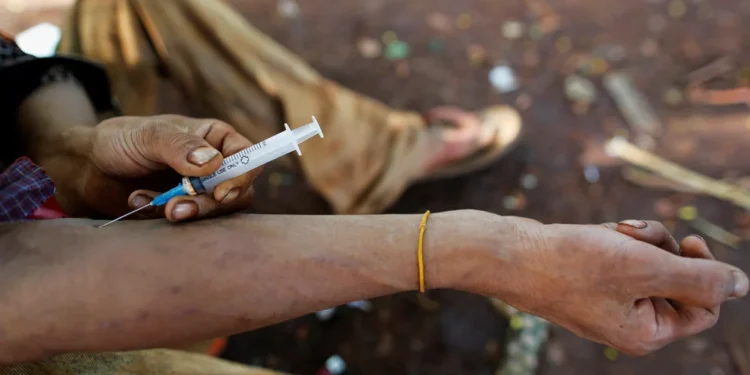A terrifying and de@dly trend linked to dr_g abus3 is gripping the streets of Bulawayo, casting a shadow of fear and concern over residents and authorities alike. The city is facing an escalating public health crisis as a dangerous practice known as “blue-toothing” or “hot-spotting” takes hold.
This chilling method involves injecting blood from one intoxicated person into another using a shared syringe. Originating around 2010 in Mexico and recently gaining popularity in South Africa, this perilous practice has now infiltrated the streets of Bulawayo.
The rapid spread of “blue-toothing” is causing alarm and jeopardizing efforts to combat drug abuse and the HIV/AIDS epidemic in Zimbabwe. Norris Pikanegora, the 44-year-old director and substance counselor for Harbit Experts Rehabilitation Centre in Bulawayo, sounded the alarm on the devastating impact of this trend.
“Blue-toothing is extremely dangerous because it exposes individuals to a multitude of life-threatening diseases such as HIV, hepatitis, and other severe infections. Most dr_g users disregard the medical status of the blood donor, focusing solely on achieving their next high, which is incredibly risky,” Pikanegora warned as reported by B Metro.
ALSO READ: PICTURES: Accident at State House – the moment you realize you’re in serious trouble
The number of youths engaging in this de@dly practice has surged, driven by the low cost of “flash blood.” Sold in small sachets for about R10, the price varies depending on the dr_g quality and the sachet size, making it an affordable alternative for those unable to buy the dr_gs themselves.
Pikanegora explained, “Different dr_gs elicit different reactions, so it costs less to buy from someone high on marijuana than from someone high on crystal meth. Dr_g dealers exploit these individuals, manipulating them with the promise of a fix, then keeping them captive to harvest their blood for sale to other users.”
These dr_g lords are notoriously difficult to identify, as they typically sell to a trusted network of long-time customers. Pikanegora emphasized the importance of community intervention, urging people to seek help for those struggling with addiction and to educate youths on the dangers of dr_g abus3.Dr. Tariro Mudadada, a medical practitioner, echoed these concerns, highlighting the severe health risks associated with sharing unsupervised syringes and needles. “Syringes need to be disposed of after a single use. However, recreational users often reuse them, exposing themselves to dangerous bacterial infections like septicaemia and sepsis, which can be fatal if untreated,” he explained.
Dr. Mudadada also warned about the lifelong consequences of contracting HIV and hepatitis through shared blood. This troubling trend has emerged just as the government launched a multi-sectoral dr_g and substance abus3 plan to address the scourge of substance abuse across the country.
Meanwhile, the problem of dr_g abus3 continues to plague communities in Bulawayo, with newer, more dangerous trends emerging. Even seemingly innocuous items like light bulbs, soap, and cough syrup are being repurposed into tools for intoxication.
Recently, a disturbing revelation came to light about students drying and scraping bath soaps, mixing the scrapings, and rolling them into paper to smoke as a method of getting high. This unsettling practice underscores the urgent need for comprehensive measures to tackle the escalating dr_g crisis in Bulawayo.









